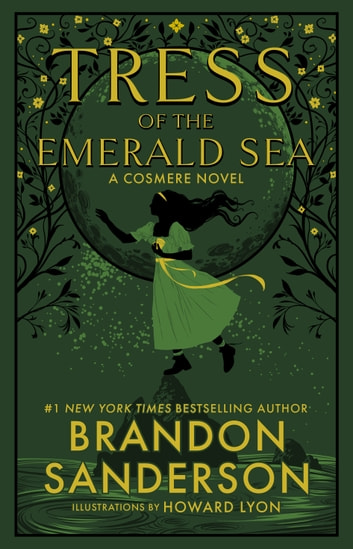Pretense reviewed Tress of the Emerald Sea by Brandon Sanderson (Secret Projects, #1)
Review of 'Tress of the Emerald Sea' on 'Goodreads'
5 stars
One of my favorite reads of the year, certainly. My first book by Brandon Sanderson was a rewarding one. I had heard repeatedly of this book, and of Sanderson’s legendary pandemic book project, but reading the first few pages of Tress of the Emerald Sea was the key recipe to get me hooked. Sanderson’s writing style, quirky and playful, felt like a breath of fresh air from other recent fantasy I’ve read—which is often trying too hard to sound overly lyrical. Sanderson brings the fantastical almost down-to-earth, while reminding the reader that this is, indeed, a fantasy world; we can take nothing for granted based on our own expectations of Earth.
Tress’s world has an emerald sea, but it is a sea made of spores, not water. Into this adventure of ignorance, the narrative can do nothing but continue to impress and subvert the reader’s subconscious biases about the fantasy genre. The worldbuilding is truly the centerpiece of this novel—it’s not like most fantasy books, and it entirely owns up to that characterization (perhaps annoyingly to a fault, at times). There are familiar elements, like witches, sea voyages, magic, and opaque curses; but as a reader, I was kept guessing until the end how they would be utilized.
From the beginning, Tress is a likeable character—in the classic fantasy heroine style, she is naïve, but her personality is somewhat self-aware. Unlike the fantasy tropes, her simpleness is not a flaw that is to be remedied or a cover for lurking greatness—her simplicity is what makes her great. She is kind, but not to a fault; she isn’t perfect—she doubts herself constantly.
In a sense, Tress felt like a realistic character. Moreover, her relationships with other characters and gradual ability to win people over was just charming. Sanderson also manages to flesh out the characters decently well, though there is no shortage of cast to introduce—even halfway through the book; even the ’villainous’ characters have depth to them.
Sanderson’s style is unfettered with garrulous descriptions and exquisite details—it’s exactly the kind of ‘to the point’ style I love reading, since it makes the experience glide along much more smoothly. His humor is also well-timed and adds to the narration; as I’ve mentioned, the book being self-aware of its role in the story (that is, as a story) makes it that much more delightful when it casually breaks the fourth wall or subverts the reader’s expectations.
Were there things that could have been better? Perhaps; it’s hard for me to recall if I had any issues with this book, given that this review is coming months late… but as it stands, I can only remember loving this book and how this book gripped me from start to finish. I wholeheartedly recommend this to anyone who enjoys fantasy, or even someone that thinks they don’t—you never know, and Sanderson is a beloved author for a reason, as I’ve come to learn.
Favorite quotes:
※ ‘That is one of the great mistakes people make: assuming that someone who does menial work does not like thinking. Physical labor is great for the mind, as it leaves all kinds of time to consider the world. Other work, like accounting or scribing, demands little of the body—but siphons energy from the mind.
If you wish to become a storyteller, here is a hint: sell your labor, but not your mind. Give me ten hours a day scrubbing a deck, and oh the stories I could imagine. Give me ten hours adding sums, and all you’ll have me imagining at the end is a warm bed and a thought-free evening.’
※ ‘Memory is often our only connection to who we used to be. Memories are fossils, the bones left by dead versions of ourselves. More potently, our minds are a hungry audience, craving only the peaks and valleys of experience. The bland erodes, leaving behind the distinctive bits to be remembered again and again. Painful or passionate, surreal or sublime, we cherish those little rocks of peak experience, polishing them with the ever-smoothing touch of recycled proxy living. In so doing—like pagans praying to a sculpted mud figure—we make of our memories the gods which judge our current lives.’
※ ‘Empathy is an emotional loss leader. It pays for itself eventually.’

